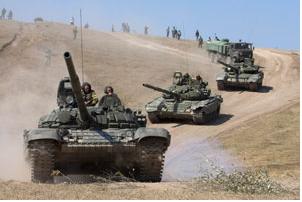
Why Russia is doing what it is doing is outlined well by The Economist here.
FROM Brussels this week NATO brandished a fist at Russia, warning it that there could be no “business as usual” so long as Russian forces remained in Georgia. The Russians, oddly, did not quail. If anything, President Dmitry Medvedev and his mentor and prime minister, Vladimir Putin, seem to be enjoying the world’s impotent indignation in the face of their new-found machismo. And why not? They know that the West will not fight for the territorial integrity of Georgia, a trisected statelet of only 4m people in the faraway Caucasus. They also know that they will face no serious economic punishment. As a collective, NATO may huff and puff, but the cold fact is that many of its big members need a lot of business with Russia to continue. Germany and others in Europe need to keep buying Russia’s oil and gas. America needs Russia, too, in order to secure vital foreign-policy objectives of its own, such as preventing Iran from acquiring nuclear weapons.It also outlines well that, even though you have to respect her wilting power, her history, and her unpredictability - you also have to pity here - though like you pity an old bear with a limp and an abscessed tooth ....
Sound policy starts with a sense of proportion. Contrary to some excitable first reactions, Russia’s ability to crush the minuscule Georgian army does not make it a superpower, and its aggression in the Caucasus need not mark the start of a new cold war. To put things in perspective, America’s GDP is ten times bigger than Russia’s and it spends at least seven times more on defence. Russia’s economy would fall off a cliff if energy prices slumped and its population, racked by ill-health and inequality, is shrinking by up to 800,000 a year. Russia can make mischief, but it cannot project military and ideological power all around the world, as the Soviet Union did during the cold war. Although it scares some neighbours (but not the Chinese), its threats make them all the more determined to stay on guard. It is surely no coincidence that after months of prevarication the Poles agreed immediately after Russia invaded Georgia to let America base missile defences (ostensibly against a future threat from Iran) on Polish territory.
To say that Russia’s strength is exaggerated is not to say that it should be allowed to escape its Georgian adventure unpunished. A weak power can be more reckless than a strong one. Russia needs to learn that in spite of their own enervating foreign wars and economic worries the members of the Western alliance can still unite in front of a challenge. But because Russia is fundamentally less strong than it likes to pretend, the West’s response can afford to be patient as well as principled.
No comments:
Post a Comment